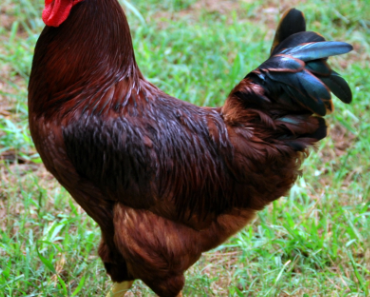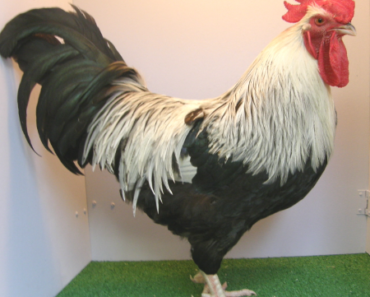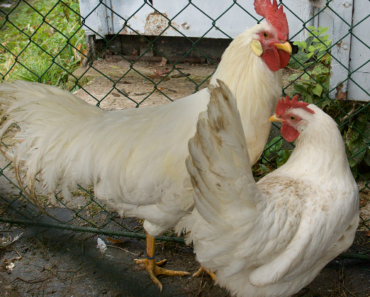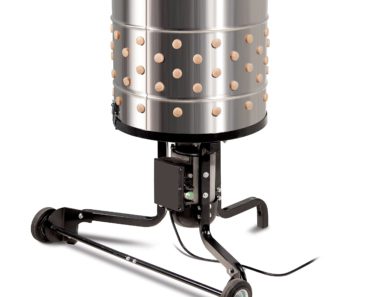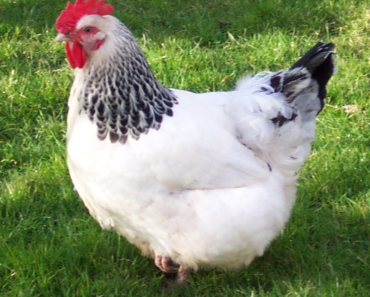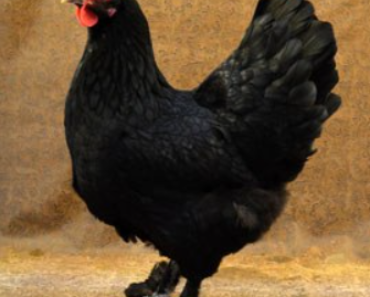Contents
- 1 Discover the Unique Traits and Rich History of New Hampshire Chickens – A Poultry Enthusiast’s Guide
- 2 History and Origins of New Hampshire Chicken
- 3 Characteristics and Appearance
- 4 Uses and Benefits
- 5 FAQ
- 5.1 What are the key characteristics and traits of New Hampshire chickens that make them well-suited for chicken farming?
- 5.2 How does the meat quality of New Hampshire chickens compare to other popular chicken breeds, and what are the factors that contribute to their unique flavor?
- 5.3 Are there any specific health concerns or diseases that New Hampshire chickens are prone to, and what are the best preventive measures to ensure their overall well-being?
- 5.4 Related Posts

We will be exploring the incredible qualities of the New Hampshire chicken. Discover why these beautiful birds are renowned for their hardiness, excellent meat production, and vibrant plumage. Join me as we delve into the world of this fascinating breed. Let’s get clucking!
Discover the Unique Traits and Rich History of New Hampshire Chickens – A Poultry Enthusiast’s Guide
New Hampshire chickens have long been admired for their unique traits and fascinating history in the world of poultry. These remarkable birds are known for their exceptional hardiness, docile temperament, and excellent egg-laying capabilities.
New Hampshire chickens originated in the early 20th century in the state of New Hampshire, USA. They were developed through selective breeding programs that aimed to create a breed that excelled in both meat production and egg-laying. The breed quickly gained popularity due to its outstanding qualities.
One of the key features of New Hampshire chickens is their distinctive appearance. They have beautiful deep red feathers that give them an eye-catching and regal look. Their bodies are well-muscled and compact, making them ideal for both meat and egg production.
Another notable trait of New Hampshire chickens is their friendly and calm nature. They are known for being easy to handle and are often recommended for families and beginners in the world of poultry-raising. Their docile temperament makes them an excellent choice for backyard flocks.
In addition to their pleasant disposition, New Hampshire chickens are also prolific egg layers. They are known for consistently producing large brown eggs, which are highly sought after by egg enthusiasts and farmers alike. This combination of excellent meat quality and exceptional egg production makes New Hampshire chickens a versatile and valuable breed.
The rich history and remarkable attributes of New Hampshire chickens make them a favorite among both poultry enthusiasts and backyard farmers. Whether you are looking to raise them for meat, eggs, or simply as friendly companions, these birds are sure to bring joy and charm to your flock. Consider adding a few New Hampshire chickens to your poultry collection and experience their unique qualities firsthand.
History and Origins of New Hampshire Chicken
The history and origins of New Hampshire Chicken can be traced back to the state of New Hampshire in the United States. This breed was developed in the early 20th century by crossing Rhode Island Reds with some other heritage chicken breeds. The goal was to create a dual-purpose breed that excelled in both meat and egg production.
New Hampshire Chickens are known for their hardiness and adaptability to different climates. The breed quickly gained popularity due to their excellent meat qualities, efficient feed conversion, and ability to lay good-sized brown eggs. Today, they are still widely recognized as an outstanding breed for small-scale farming and backyard chicken keeping.
Characteristics and Appearance
New Hampshire Chickens are medium to large-sized birds with a sturdy build. They have a deep, broad chest, which contributes to their meaty carcass. Their feathers are a rich, vibrant shade of chestnut red, and their legs are yellow.
One of the defining features of New Hampshire Chickens is their bright red comb and wattles. Their eyes are a deep reddish bay color, creating a striking contrast against their plumage. This breed has a friendly and docile temperament, making them suitable for both rural and urban environments.
Uses and Benefits
New Hampshire Chickens are primarily raised for meat production, as they reach market weight relatively quickly compared to other heritage breeds. Their broad breasts and well-developed thighs make them an excellent choice for those seeking quality meat. Moreover, their efficient feed conversion rate ensures cost-effectiveness in meat production.
Despite being bred for meat, New Hampshire Chickens also exhibit good egg-laying capabilities. They can produce around 200 to 280 brown eggs per year, making them a reliable source of fresh eggs for households or small-scale egg production operations.
Overall, the New Hampshire Chicken breed offers a balance between meat and egg production, making them a popular choice for chicken enthusiasts looking for a versatile bird with excellent qualities in both categories.
FAQ
What are the key characteristics and traits of New Hampshire chickens that make them well-suited for chicken farming?
New Hampshire chickens are a popular breed for chicken farming due to their key characteristics and traits. These birds are well-suited for chicken farming due to their hardiness, adaptability, and productive nature.
One key characteristic of New Hampshire chickens is their hardiness. They are known for their ability to withstand various weather conditions, including cold temperatures. This makes them suitable for farming in different regions, even those with harsh climates.
Another important trait of New Hampshire chickens is their adaptability. They can thrive in a variety of environments, including free-range or confinement systems. Whether on pasture or in a coop, they are able to make the most of their surroundings and continue to produce high-quality meat and eggs.
New Hampshire chickens are also valued for their productivity. They are excellent layers and consistently produce large brown eggs. This makes them a profitable choice for egg production farms. Additionally, they grow at a relatively fast rate and have good meat quality, making them suitable for meat production as well.
Some of the key characteristics and traits of New Hampshire chickens that make them well-suited for chicken farming include their hardiness, adaptability, and productivity. These qualities make them a reliable and profitable choice for both egg and meat production.
How does the meat quality of New Hampshire chickens compare to other popular chicken breeds, and what are the factors that contribute to their unique flavor?
The meat quality of New Hampshire chickens is highly regarded and compares favorably to other popular chicken breeds. Factors that contribute to their unique flavor include:
1. Genetics: New Hampshire chickens have been selectively bred for their meat quality. They have a good amount of muscle, which leads to tender and flavorful meat.
2. Feed: The diet of the chickens greatly influences the flavor of their meat. Proper nutrition and a balanced diet contribute to a rich and delicious taste. New Hampshire chickens are typically raised on a high-quality feed that enhances their flavor.
3. Age at processing: The age at which chickens are processed affects the tenderness and flavor of their meat. New Hampshire chickens are typically processed at an optimal age to ensure the best quality meat.
4. Free-range vs. confinement: Chickens that are allowed to roam freely and have access to natural vegetation and insects tend to develop a more intense and complex flavor. Free-range New Hampshire chickens, when compared to those raised in confinement, often have a more robust taste.
5. Proper handling and processing: The way chickens are handled and processed after slaughter can significantly impact their flavor. Careful and hygienic handling during processing helps maintain the quality and flavor of the meat.
Overall, New Hampshire chickens are known for their tender and flavorful meat thanks to their genetics, diet, processing, and rearing methods.
Are there any specific health concerns or diseases that New Hampshire chickens are prone to, and what are the best preventive measures to ensure their overall well-being?
New Hampshire chickens are generally quite hardy and resistant to diseases. However, there are a few common health concerns that all chicken owners should be aware of and take preventive measures against.
1. Respiratory diseases: Chickens can be prone to respiratory infections, especially in crowded or poorly ventilated environments. To prevent these, ensure that the coop is clean and well-ventilated. Avoid overcrowding the chickens and provide adequate space per bird.
2. Parasites: External parasites such as mites and lice can cause discomfort and health issues for chickens. Regularly inspect your chickens for signs of infestation and treat them accordingly. Keep the coop clean and consider using natural remedies or commercial products to control parasites.
3. Coccidiosis: This is a common intestinal disease in chickens caused by microscopic parasites. Good hygiene practices, such as regular cleaning of the coop and keeping the feed and water areas clean, can help prevent the spread of coccidiosis. Additionally, providing a balanced diet and avoiding stressors can help boost the chickens’ immune system to prevent severe infections.
4. Marek’s disease: This is a highly contagious viral disease that primarily affects young chickens. Vaccination is the most effective way to prevent Marek’s disease. Consult with a poultry veterinarian about vaccinating your chickens.
5. Heat stress: New Hampshire chickens have medium-sized single combs, which can make them more susceptible to heat stress. Ensure that the coop has proper ventilation and shade, and provide access to cool water during hot weather.
Regular observation and monitoring of your chickens’ behavior, appetite, and droppings can help you detect any potential health issues early on. If you notice any abnormal signs or symptoms, consult a poultry veterinarian for proper diagnosis and treatment.
The New Hampshire chicken is a remarkable breed that deserves recognition in the world of chicken enthusiasts. Its vibrant red feathers, robust physique, and excellent meat quality make it an attractive choice for both backyard poultry keepers and commercial farmers. The breed’s hardiness and adaptability allow it to thrive in various climates, making it a versatile option for chicken owners worldwide. Whether you are looking to enhance your flock’s appearance or seeking a delicious meat source, the New Hampshire chicken is an exceptional choice. Consider adding this alluring breed to your flock and enjoy the numerous benefits it brings.

